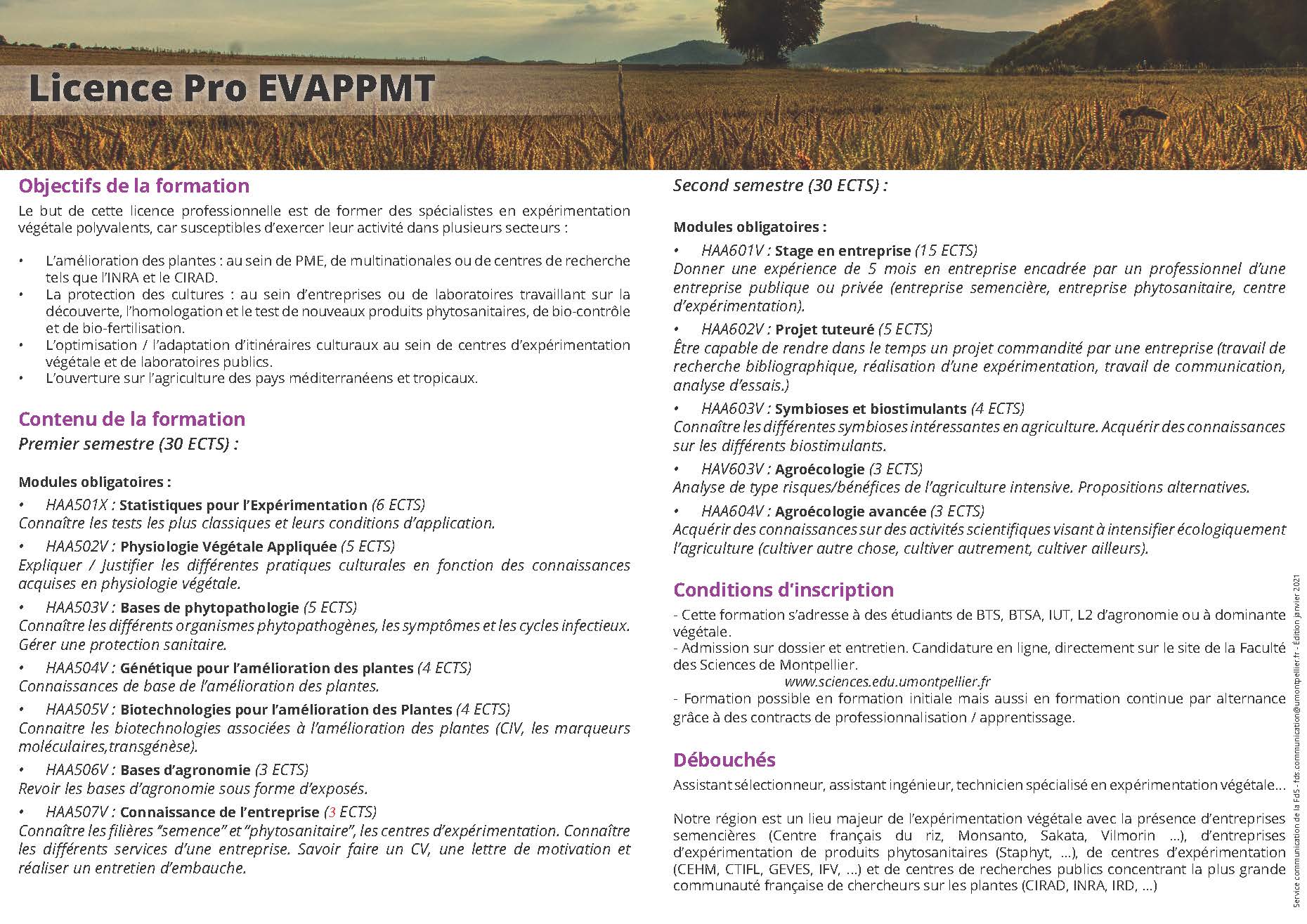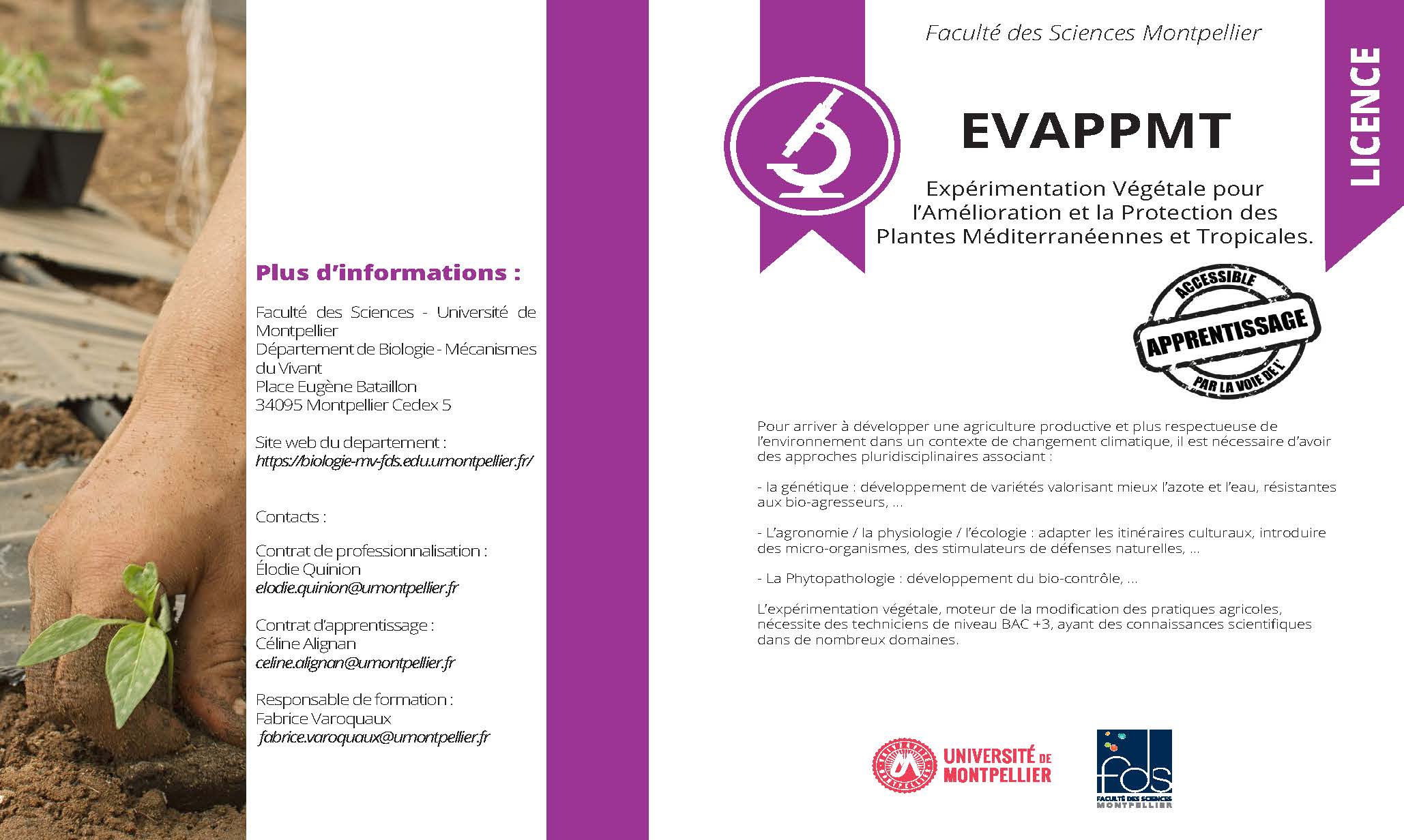Target level of study
Bachelor's degree
Training structure
Faculty of Science
Language(s) of instruction
French
Presentation
The vast majority of plant-based foods are produced through intensive agriculture. This form of agriculture was introduced in France after World War II. It perfectly met the socio-economic demands of the time by enabling food to be produced in large quantities and at low cost. The development of intensive agriculture was only possible thanks to fundamental research in various fields such as biology and plant physiology, genetics, and agronomy. It is now widely accepted that half of the progress made in crop yields is due to agronomy and half to genetics. This past experience suggests that a multidisciplinary approach based on intensive scientific research is necessary to develop a new type of agriculture.
Intensive agriculture does not only have positive qualities. It relies on the massive use of inputs (fertilizers and plant protection products), which is a source of environmental pollution and causes health problems. It therefore seems important to radically change agricultural practices in order to limit the use of inputs and move towards a model of sustainable agriculture. This shift in agricultural practices began around 20 years ago, but has been accelerated by the ECOPHYTO plan, which aims to reduce the use of plant protection products. This agricultural reform must also be carried out under the pressure of an additional challenge: climate change. In order to develop more environmentally friendly agriculturein the context of climate change, it is necessary to take a multidisciplinary approach combining genetics (development of varieties that make better use of nitrogen and water, are resistant to existing diseases, etc.),agronomy/physiology/ecology (adapting crop management practices, introducing microorganisms, natural defense stimulators, etc.), and phytopathology (development of biocontrol, etc.). Plant experimentation, which is driving changes in agricultural practices, therefore requires technicians with a bachelor's degree and scientific knowledge in many fields.
The aim of this professional degree, which was launched in 2015, is to train versatile plant experimentation specialists who are likely to work in several sectors:
– Plant improvement within SMEs, multinationals, and research centers such as INRA and CIRAD. The seed industry is extremely important in France, as it is the leading European producer and the leading exporter worldwide. This sector represents more than 15,000 full-time equivalent jobs and approximately €2.9 billion in revenue. It is also interesting to note that the research budget is €236 million and has increased by 25% in five years. Seed companies are particularly well established in the south of France: almost all of them have an experimental station within a 100 km radius of Nîmes.
– Protection of crops within companies or laboratories working on the discovery, approval, or testing of new plant protection products. Replacing plant protection products with less harmful natural substances is one of the most difficult challenges facing agriculture in the future. The development of companies involved in biological control (use of macro- or micro-organisms, natural defense stimulators, etc.) began in 1985, when 200 small companies shared a turnover of $150 million (global data). It was only a niche market, representing just 1% of plant protection product sales. This market has grown, reaching $1 billion in 2009, and forecasts suggest that it will be worth $8 billion between 2015 and 2020. The development of such substances requires extensive experimentation, some of which will be carried out by fast-growing companies in the Montpellier region (Staphyt).
– Optimization/adaptation of crop management practices within plant experimentation centers and research centers. There are numerous experimentation centers in the region, such as GEVES, CTIFL, CEHM, and ARVALIS.
While the challenges of developing sustainable agriculture are important for developed countries, they are crucial for many countries in the South, which cannot afford fertilizers or plant protection products anyway. CIRAD and IRD have developed partnerships with research centers in southern countries. Seed and production companies (e.g., sugar) in the South need high-quality senior technicians.
Objectives
The L3Pro EVAPPMT aims to provide the knowledge, expertise, and skills necessary to work as an experimental technician in various sectors. The five-month internship and tutored project allow students to put the theoretical knowledge they have learned in class into practice. The program also welcomes work-study students: continuing education, professional contracts, and apprentices. Work-study programs are an undeniable asset for professional integration into private companies.
Know-how and skills
Disciplinary skills:
- methods of creative selection and seed production.
- methods for (i) testing and approving plant protection products, (ii) testing new plant varieties, and (iii) testing new technical approaches aimed at limiting the use of inputs and enabling crops to be adapted to climate change or changes brought about by legislation (e.g., restrictions on plant protection products).
- the establishment of experimental designs and statistical treatments.
- plant experimentation in southern countries.
.
Cross-functional skills:
- Implement, manage, observe, and evaluate plant experiments in the fields of genetic improvement and crop protection, particularly biocontrol, independently.
- Conduct scientific and technical literature reviews.
- Optimize experimental protocols.
- Analyze and report the results to your supervisor, proposing hypotheses or solutions necessary for the continuation of the work.
- Developing a career plan, writing a resume, cover letters
- Ability to work independently and as part of a team
- Gain initial experience of entering the workplace
Organization
Knowledge assessment
Knowledge assessments are a combination of continuous assessments and final exams.
Special facilities
To follow this course, you will need a suitable laptop computer. Some of the statistics classes and exams are conducted using R. Computer use is required to complete the tutored projects and various assignments within the modules. Depending on health conditions, some classes may be held remotely, requiring not only a computer but also a reliable internet connection.
Open alternately
Type of contract | Apprenticeship contract, Professional training contract |
|---|
A schedule has been drawn up to accommodate work-study students (apprenticeships, professional contracts), people in vocational training, and students in continuing education.
Internships, supervised projects
Internship | Mandatory |
|---|---|
Duration of the internship | 5 |
Internship abroad | Possible |
Duration of the internship abroad | 5 |
The five-month internship runs from April 1 to August 31. It can be done in a company, technical center, or public research organization. For more information, see the "company internship" module.
The tutored project takes place between early January and mid-March. For more information --> see the "tutored project" module.
Program
Teaching in the L3pro EVAPPMT program is spread over two semesters, each comprising teaching units (UE) which, when validated, award ECTS credits. The teaching units are not widely shared and allow for excellent specialization in plant experimentation. TheL3ProEVAPPMT can be taken as an initial training course or as a work-study program. This has required the implementation of a calendar adapted to the work-study program.
Select a program
L3 - Professional Degree - Plant Experimentation for the Improvement and Protection of Mediterranean and Tropical Plants (EVAPPMT)


Genetics for plant breeding
4 creditsBiotechnology for plant improvement
4 creditsFundamentals of agronomy
3 creditsStatistics for Experimentation
6 creditsBusiness knowledge
3 creditsApplied Plant Physiology
5 creditsFundamentals of plant pathology
5 credits
Fundamentals of agroecology
3 creditsSupervised project
5 creditsInternship
15 creditsAdvanced agroecology
3 creditsSymbiosis and biostimulants
4 credits
Admission
Admission requirements
The EVAPPMT professional degree program primarily recruits students who have completed:
- BTS degrees related to plant production (e.g., APV, PH)
- BTS degrees related to biotechnology/laboratory techniques (e.g., ANABIOTEC)
- DUTs (university technical degrees) in Biological Engineering.
A few places are also reserved for students from other programs (various master's degrees, L3 plant science, etc.).
Registration procedures
Applications must be submitted via the e-candidat portal of the University of Montpellier's Faculty of Science. They are reviewed by an academic committee, which decides on admission. Candidates' motivation and their prospects in the field of plant experimentation are important selection criteria. Although not mandatory, obtaining a work-study contract is strongly encouraged.
French and European students: follow the "eCandidat" procedure on the website: https://ecandidat.umontpellier.fr/ecandidat/
Target audience
Mandatory prerequisites
Two-year college degree in agronomy, crop protection, plant production, biological engineering, and biotechnology.
Have a working computer and internet connection
Recommended prerequisites
Have obtained a professional/work-study contract or identified companies likely to offer work-study contracts.
And after
Continuing education
The L3pro EVAPPMT program is designed to train experimental technicians who will enter the workforce upon completion of the program. A small number of students may continue their studies in a professional master's program or engineering school, although this is not encouraged.
Professional integration
Sectors of activity: The aim of this professional degree is to train versatile plant experimentation specialists who are likely to work in several sectors:
– Plant improvement within SMEs, multinationals, or research centers such as INRAE and CIRAD
– Crop protection within companies or laboratories working on the discovery, approval, or testing of new plant protection products/biocontrols.
– Optimization/adaptation of crop management practices within plant experimentation centers and public or private laboratories
Types of jobs available: The targeted professions are assistant selector, assistant engineer, and technician specializing in plant experimentation.
Examples.
1- Work in a seed company
- Experimental technician, "Marketing" (testing varieties after marketing, assisting seed growers [protocol optimization])
- Production testing technician (seed quality testing)
- Research technician (assistant selector)
For more information about these professions:
http://www.gnis-pedagogie.org/fiches-metiers-semences-vegetales.html
2- Work in an experimental company
- Seed testing technician.
- Plant protection and nutrition testing technician.
- Environment and auxiliary fauna experimenter.
For more information about these professions:


